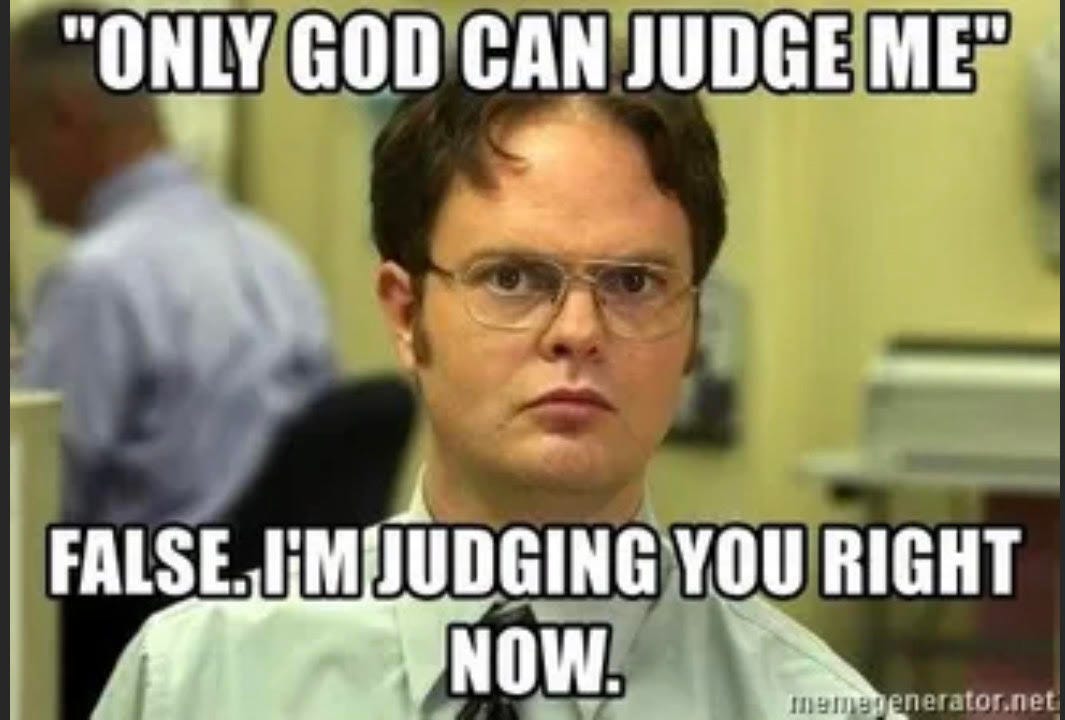Every Advent season, right before Christmas begins, two other ladies and I have dinner together. This year, we went to a sushi bar and after chatting awhile, one of the ladies wanted to reiterate that she doesn’t judge anyone. I looked straight at her (let’s call her Angela) and said, “Well, I judge people all the time.” The shock was palpable. There were some comments like, “Only God can judge me.” Seriously?
We discussed what I meant by that and why Christians (and others) absolutely should judge, must judge others, but do it carefully and with charity. The “never judge others” mindset arises out of a cherry-picked, distorted passage from scripture (more on that later). I’m certain everyone reading this has heard some variation on the following:
“Don’t judge.”
“You do you and I’ll do me.”
“You have your truth and I have mine.”
“I’m living my truth.”
Make it stop!
Obviously, it’s a virtue to mind one’s own business. Not being the community gossip or ‘morality sheriff’ when you don’t have all the facts is a good thing. It’s crucial to know the details of a situation to make a good judgment about another person, or even to give good and sound advice. Regarding advice, some people may take it as judgment and become all colors of offended by it. It happens.
Why and when should we judge others
Contrary to what the virtue signaling ‘don’t judge others’ crowd may think, refusing to make any judgment at all does not put you on some sort of virtuous high point. It’s actually a moral failing to fail to judge.
Think about it. Do you judge who your daughter or son can hang out with? What kind of boys can date your daughter? If you’re single, do you judge potential dates? Do you judge whether an area of town (or on a hiking trail) is safe? What about people who steal purses from little old ladies? Do you judge them? Do you judge what attire is appropriate for certain occasions? I sure hope you do!
We make choices every single day. Many, possibly most, of those choices are trivial. It’s not that they don’t matter, it’s just that they’re not necessarily life-altering. Occasionally, we come upon a choice that’s very important — a significant choice with potential to change our lives. To make sound choices in these situations, it’s imperative that we have the ability to judge the good from the bad, or even the better from the good.
What motivates our judgments?
The motivation behind our judgments matters. Every choice or action (which involves judging) is motivated by our values. People of high character and integrity align their choices with their values. Since we make judgments every day, we must ensure that the choices arising from those judgments are moral ones.
This includes our judgments of others and, subsequently, choosing whether or not to privately, with charity, correct them. Or, it may be a quick judgment about whether or not your teen can hang out with a certain person. This won’t involve correcting the person, should you deem your teen cannot cultivate a friendship with him or her. But it will (or should) involve thinking hard about why you’re making this decision.
People use Matthew 7:1 to silence anyone who criticizes their actions:
“Judge not, that you may not be judged.” ~ Matt 7:1, Douay-Rheims translation
They wrongly interpret this line as Jesus meaning, “You have no right to tell me I’m wrong.”
However, if they read any further (they rarely do), they would read these words from Our Lord:
“Give not that which is holy to dogs; neither cast ye your pearls before swine, lest perhaps they trample them under their feet, and turning upon you, they tear you.” ~ Matt 7:6, Douay-Rheims translation
and
“Beware of false prophets, who come to you in the clothing of sheep, but inwardly they are ravening wolves. By their fruits you shall know them. Do men gather grapes of thorns, or figs of thistles?” ~ Matt 7:15-16, Douay-Rheims translation
But Jesus is actually giving us permission to discern right from wrong here. Obviously, superficial judgment is wrong and we should avoid it at all costs. Discernment is key.
Even for non-believers, these things hold true. After all, it’s often non-believers — even those who bitterly hate all things religious — who use the phrase, “…don’t judge others.”
And, it’s important to keep one’s own house in order before correcting others. We’re none of us perfect and we all have some cobwebs in the corners. But before chastising someone for their cigarette smoking, make sure you aren’t imbibing in some other way (pot smoking, smoking other funny things). I just used that as an example. Please don’t go on and on in the comments about the ‘wonders of cannabis.’ If you smoke it, don’t judge someone who smokes cigarettes. That’s all I’m saying.
The late great Justice Antonin Scalia [1936 - 2016] said, “I attack ideas. I don’t attack people. And some very good people have some very bad ideas. And if you can’t separate the two, you gotta get another day job.”
Do not be afraid to speak against the moral sickness and the depravity we’re seeing in our world right now. Often, to do so, seems like a zero sum game and even dangerous, but you must do it. Do it based on your own sound moral values and integrity. It may not be fun, but it’s an heroic action. People will attack you and deride you. That’s how you know you’re probably getting it right.
Every day is a knife fight. Fight on, Church Militant.
NEW OFFER: Commission an article!








Nice!
I wish I had Scalia's ability to so readily separate person and idea; or, I wish I had more of it than I do, since I don't think he's fully right about this.